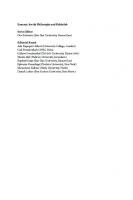Man and Nature: Or, Physical Geography as Modified by Human Action 9780674040632
George Perkins Marsh's Man and Nature was the first book to attack the American myth of the superabundance and the
223 56 40MB
English Pages 503 [505] Year 2009
Recommend Papers

- Author / Uploaded
- George Marsh (editor)
- David Lowenthal (editor)
File loading please wait...
Citation preview
THE JOHN HARVARD LIBRARY Bernard Bailyn Editor-in-Chief
The John Harvard Library
MAN AND NATURE By GEORGE PERKINS MARSH
Edited by David Lowenthal
THE BELKNAP PRESS OF HARVARD UNIVERSITY PRESS Cambridge, Massachusetts
Originally published in 1864
C Copyright 1965 by the President and Fel/,ou;s ofHarvard College AU rights reserved .Printed in the United States ofAmerica
Library ofCongress Catalog Card Number 65-11591
ISBN 0-674-54452-8 This book has been digitally reprinted. The content remains identical to that of previous printings.
CONTENTS ix
Introduction by David Lowenthal
xxvii
A Note on the Text
MAN AND NATURE 3
Preface CHAPTER I.
INTRODUCTORY Natural Advantages of the Te"itory of the Roman Empire • Physical Decay of that Territory and of other parts of the Old World • Causes of the Decay • New School of Geographers • Reaction of Man upon Nature • Observation of Nature • Cosmical and Geological Influences • Geographical Influence of Man • Uncertainty of our Meteorological Knowledge • Mechanical Effects produced by Man on the surface of the Earth • Importance and Possibility of Physical Re$foration • Stability of Nature • Restoration of Disturbed H armonks • Destructiveness of Man • Human and Brute Action Compared • Physical Improvement • Arrest of Physical Decay of New Countries • Forms and Formations most liable to Physical Degradation • Physical Decay of New Countries • Corrupt Influence of Private Corporations, Note. 7 CHAPTER II.
TRANSFER, MODIFICATION, AND EXTIRPATION OF VEGETABLE AND OF ANIMAL SPECIES ~lodem Geography embraces Organic Life • Transfer of Vegetable Life • Foreign Plants grown in the United States • American Plants grown in Europe • Modes of Introduction of Foreign Plants • Vegetables, how affected by transfer to Foreign Soils • Extirpation of Vegetables • Origin of Domestic Plants • Organic Life as a Geological and Geographical Agency • Number of Quadrupeds in the United States • Origin and Transfer of Domestic Quadrupeds· Extirpation of Quadrupeds· Numbers of Birds in the United States • Birds as Sowers and Consumers of Seeds, and as Destroyers of Insects • Diminution and Extirpation of Birds • Introduction of Birds • Utility of Insects and Worms • Introduction of Insects • Destruction of Insects • Reptiles • Destruction of Fish • Introduction and Breeding of Fish • 53 Extirpation of Aquatic Animals • Minute Organisms.
CHAPTER VI.
THE WOODS The Habitable Earth originaUy Wooded • The Fore$f does not furnish Food for Man • First Removal of the Woods • EDects of Fire on Fore$f Soil • Effects of
vi
CONTENTS
the Destruction of the Forest • Electrical Influence of Trees • Chemical Influence of the Forest. Influence of the Forest, considered as Inorganic Matter, on Temperature: a, Absorbing and Emitting Surface; b, Trees as Conductors of Heat; c, Trees in Summer and in Winter; d, Dead. Products of Trees; e, Trees as a Shelter to Grounds to the leeward of them; f, Trees as a Protection against Malaria • The Forest, as Inorganic Matter, tends to mitigate extremes. Trees as Organisms: Specific Heat • Total Influence of the Forest on Temperature. Influence of Forests on the Humidity of the Air and the Earth: a, as Inorganic Matter; b, as Organic-Wood Mosses and Fungi-Flow of Sap-Absorption and Exhalation of Moisture by Trees; Balance of Conflicting Influences • Influence of the Forest on Temperature and Precipitation • I n/luence of the Forest on the Humidity of the Soil • Its Influence on the Flow of Springs • The Forest in Winter • General Consequences of the Destruction of the Forest • Condition of the Forest, and its Literature in different Countries • The Influence of the Forest on Inundations • Destructive Action of Torrents • Transporting Power of Rivers • The Po and its Deposits • Mountain Slides • Protection against the Fall of Rocks and Avalanches by Trees • Principal Causes of the Destruction of the Forest • American Forest Trees • Special Causes of the Destruction of European Woods • Royal Forests and Game Laws • Small Forest Plants, and Vitality of Seeds • Utility of the Forest • The Forests of Europe • Forests of the United States and Canada • The Economy of the Forest • European and American Trees Compared • Sylviculture • Instability of· American Life. 113
CHAPTER IV.
THE WATERS Land artificially won from the Waters: a, Exclusion of the Sea by Diking; b, Draining of Lakes and Marshes; c, Geographical Influence of such Operations • Lowering of Lakes • Mountain Lakes • Climatic Effects of Draining Lakes and Marshes. Geographical and Climatic Effects of Aqueducts, Reservoirs, and Canals • Surface and Underdraining, and their Climatic and Geographical Effects • I rrigation and its Climatic and Geographical Effects. Inundations and Torrents: a, River Embankments; b, Floods of the Ardeche; C, Crushing Force of Torrents; d, Inundations of 1856 in France; e, Remedies against Inundations-Consequences if the Nile had been confined by Lateral Dikes. Deposits of the Tuscan Rivers • Improvements in the Val di Chiana • Improvements in the Tuscan Maremma • Obstruction of River Mouths • Subterranean Waters • Artesian Wells • Artificial Springs • Econ01nizing Precipitation. 281
CHAPTER V.
THE SANDS Origin of Sand • Sand now carried down to the Sea • The Sands of Egypt and the adjacent Desert • The Suez Canal • The Sands of Egypt • Coast Dunes and Sand Plains • Sand Banks • Dunes on Coast of America • Dunes of Western Europe • Format-ion of Dunes • Character of Dune Sand • Interior Structure of Dunes • Form of Dunes • Geological Imponance of Dunes • Inland Dunes • Age, Character, and Permanence of Dunes • Use of Dunes as Barrier against the Sea • Encroachments of the Sea • The Liimfiord • Coasts of Schleswig-Holstein~ Holland~ and
CONTENTS
vii
France • Drifting of Dune Sands • Dunes of Gascony • Dunes of D'enmark • Dunes of Prussia • Control of Dunes by Man • Artificial Formation of Dunes • Protection of Dunes • Trees suitable for Dune Plantations • Extent of Dunes in Europe • Dune Vineyards of Cap Breton • Removal of Dunes • Inland Sand Plains • The Landes of Gascony • The Belgian Campine • Sands and Steppes of Eastern Europe • Advantages of Reclaiming the Sands • Government Works of Improvement. 382 CHAPTER VI.
PROJECTED OR POSSIBLE GEOGRAPHICAL CHANGES BY MAN Cutting of Marine Isthmuses • The Suez Canal • Canal across Isthmus of Darien • Canals to the Dead Sea • Maritime Canals in Greece • Canal of Saros • Cape Cod Canal • Diversion of the Nile • Changes in the Caspian • Improvements in North American Hydrography • Diversion of the Rhine • Draining of the Zuiderzee • Waters of the Karst • Subterranean Waters of Greece • Soil below Rock • Covering Rock with Earth • Wadies of Arabia Petrrea • Incidental Effects of Human Action • Resistance to great Natural Forces • Effects of Mining • Espy~s Theories • River Sediment • Nothing small in Nature. 437
Index
467
Man and Nature was supposed to be ~'a little volume showing that whereas [others] think that the earth made man, mall in fact made the earth."! And in tamperillg with nature, the author warned a century ago in this prophetic book, man might destroy himself. "Even now," he declared ominously, ~'we are breaking up the Hoor and wainscoting and doors and window frames of our dwelling, for fuel to warm our bodies and seethe our pottage." Through wanton destruction and profligate waste the earth was "fast becoming an unfit home for its noblest inhabitant . . . Another era of equal human crime and human improvidence . . . would reduce it to such a condition of impoverished productiveness, of shattered surface, of climatic excess, as to threaten the depravation, barbarism, and perllaps even extinction of the species."2 Man and Nature was written to reveal this menace, to explain its causes, and to prescribe some antidotes. Few books have had more impact on the way men view and use land. Appearing at the peak of American confidence in the inexhaustibility of resources, it was the first book to controvert the myth of superabundance and to spell out the need for reform. It showed how man differed from nature; it showed how nature operated within itself; it showed exactly what happened to nature when men cleared and farmed and built. Before Marsh wrote this book, few saw;' and fewer worried about how man affecte(l his environment. Today Marsh's illsights are virtually taken for granted. Man and Nature was indeed "the fountainhead of the conservation movement."3 It is worth reading after a hundred years not only because it taught important lessons in its day, but also because it still teaches them so well. We have in the interim learned much about human and natural behavior. But Marsh's expose of the damage man has done to the earth is more graphic and comprehensive than any later work on conservation. Historical insight and con1 George Perkins Marsh to Spencer Fullerton Baird, May 21, 1860, Baird Correspondence, Smithsonian Institution. 2 Man and Nature, pp. 52 and 43, below. 3 Lewis Mumford, The Brown Decades: a Study of the Arts in America, 18651895 (New York, 1931), p. 78.
x
INTRODUCTION
temporary passion make Man and Nature an enduring classic. The mighty prophet of modern conservation was no professional ecologist but a self-trained, small-town Vermont lawyer and politician, a self-styled mechanic, a professional diplomat, and an omnicompetent scholar. What impelled him to write this book was dismay at the ignorance and awareness of the power of man, and an abiding love of nature. Knowing what nature was ideally like and sensing what man could become, he found the waste of both intolerable. Man and Nature was a task that gave Marsh great pleasure: it il1dulged his passion for landscape, it gave point to excursions, it gratified his practical, mechanical, down-to-earth bent. But he considered himself a mere dabbler in what he called physical geography, which was only a sideline in his many-faceted career. His associates likewise viewed him as a linguist, historian, litterateur-anything but a geographer. Even his publisher held his scientific talents in such low esteem that when he received the manuscript of Man and Nature he urged Marsh to abandon the topic and prepare a textbook "in the department of English languages and literature of which you are the acknowledged head."4 It was seventy years before Man and Nature was generally recognized as Marsh's major contribution. How did a busy man without formal training accomplish such a work? He read omnivorously and rapidly in twenty languages. He lived and traveled extensively in lands where man's impact was strikingly apparent. Marsh's pursuits, passions, and accomplishments put him in easy touch with scholars and statesmen throughout the world. He remembered almost everything he read, saw, and heard, and with an intuitive grasp of natural and historical processes he constantly checI



![Human Geography in Action [6 ed.]
9781118422571, 2012039757, 9781118291528](https://ebin.pub/img/200x200/human-geography-in-action-6nbsped-9781118422571-2012039757-9781118291528.jpg)




![Shaping the Geography of Empire: Man and Nature in Herodotus' Histories [online ed.]
0198820437, 9780198820437](https://ebin.pub/img/200x200/shaping-the-geography-of-empire-man-and-nature-in-herodotus-histories-onlinenbsped-0198820437-9780198820437.jpg)
